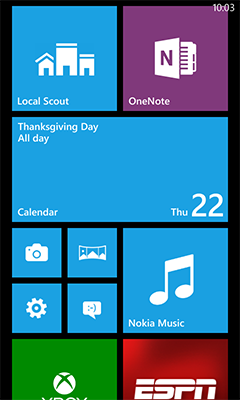
Back ويندوز فون 8 Arabic Windows Phone 8 Tibetan Windows Phone 8 Catalan Windows Phone 8 Czech Microsoft Windows Phone 8 German Windows Phone 8 Spanish ویندوز فون ۸ Persian Windows Phone 8 French Windows Phone 8 HAK विंडोज़ फोन ८ Hindi
| Version of the Windows Phone operating system | |
 Start screen | |
| Developer | Microsoft Corporation |
|---|---|
| OS family | Windows 8 |
| Working state | Discontinued |
| Source model | Closed-source |
| General availability | October 29, 2012 |
| Latest release | Update 3 (Build 8.0.10532.166) / April 14, 2014[1] |
| Update method | Firmware over the air |
| Package manager | XAP, APPX |
| Platforms | 32-bit ARM architecture |
| Kernel type | Hybrid (NT kernel)[2] |
| License | Commercial proprietary software |
| Preceded by | Windows Phone 7 (2010) |
| Succeeded by | Windows Phone 8.1 (2014) |
| Official website | Archived official website at the Wayback Machine (archive index) |
| Support status | |
| Unsupported as of January 12, 2016 [1] | |
Windows Phone 8 is the second generation of the Windows Phone mobile operating system from Microsoft. It was released on October 29, 2012, and, like its predecessor, it features a flat user interface based on the Metro design language. It was succeeded by Windows Phone 8.1, which was unveiled on April 2, 2014.[3][4]
Windows Phone 8 replaces the Windows CE-based architecture used in Windows Phone 7 with the Windows NT kernel found in Windows 8. As a consequence of this, Windows Phone 7 devices cannot run or update to Windows Phone 8, and new applications compiled specifically for Windows Phone 8 are not made available for Windows Phone 7 devices. Developers can make their apps available on both Windows Phone 7 and Windows Phone 8 devices by targeting both platforms via the proper SDKs in Visual Studio.[5]
Windows Phone 8 devices were manufactured by Microsoft Mobile (formerly Nokia), HTC, Samsung and Huawei.[6]
- ^ http://blogs.windows.com/windows_phone/b/windowsphone/archive/2013/10/14/announcing-our-third-windows-phone-8-update-plus-a-new-developer-preview-program.aspx
- ^ Jo Foley, Mary (June 20, 2012). "Microsoft's Windows Phone 8 finally gets a 'real' Windows core". ZDNet. Archived from the original on June 22, 2012. Retrieved December 25, 2012.
- ^ "Microsoft begins sharing Windows Phone 8.1 with developers". The Verge. Vox Media. February 10, 2014.
- ^ "Windows Phone 8.1 includes universal apps and lots of feature updates". The Verge. Vox Media. February 11, 2014.
- ^ Rubino, Daniel. (October 29, 2012). Overview and Review of Windows Phone 8 Archived October 18, 2014, at the Wayback Machine
- ^ Nokia, Samsung, HTC, and Huawei will have first Windows Phone 8 devices Archived April 28, 2017, at the Wayback Machine. The Verge. June 20, 2012